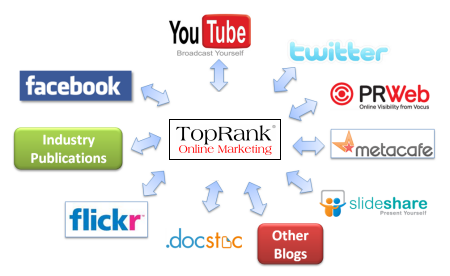
Hub & Spoke Content & Social Media Publishing
While there’s plenty of great Search Engine Optimization advice being published daily on blogs and industry websites, there’s not as much from a content marketer’s perspective. Having been in the SEO game for over 10 years, I know there’s a tendency to give recommendations that focus on web pages, code, links and what those things mean, specific to search engines. There’s an increasing social media component to these audits too. Most SEOs will read that and say, “Of course, what else do you need?”
If you work for a company or agency that received a standard SEO audit, you may have experienced the need for the SEO advice to be translated into something meaningful for your specific area of responsibility. This affects designers, web developers, copywriters, marketing, PR and other departments. A lot of SEO audits are technical in nature or focus on keyword usage and links. As the importance of content grows, it makes sense to package SEO advice in a way that considers the capabilities and constraints of content strategists, creators and marketers.
Here are some fundamental and practical questions to answer when developing a SEO approach for content marketing:
- What are your goals? – Be specific. Sales, Awareness, Media Coverage, Customer Support, Attracting New Staff, Branding. Content Marketing affects a lot more than just sales.
- Do you have access to editing current content? – Companies vary on their policies regarding editing existing content, especially if there’s an arduous process for getting anything published in the first place. But you need to know to what degree can existing content be slightly edited for SEO.
- Do you have access to website templates & code edits? – Most content marketers are not web developers so having access to IT or a web team is a pre-requisite for getting to templates. Websites that use content management systems use templates to produce web pages. SEO edits that can be made at the template level can affect hundreds or thousands of pages. Having access to making those kinds of changes can result in a very significant impact on search engine visibility.
- Can you provide SEO training for content creators? – Providing SEO best practices training to those in the company responsible for creating content helps create SEO scalability in the organization. Try to get them together in person or virtually for SEO and keyword usage training. Provide best practices and guidelines customized to the company Content Management System and content creation/review/publishing workflow.
- What ongoing feedback can you provide?– Can you create a method to provide any kind of performance feedback on the content being optimized? It can be very motivating for copywriters to know the keyword optimization tactics they’re using are actually having an impact.
- Do you have access for new content creation and publishing? – Competitive industries can rarely rely on existing content alone to satisfy search engines’ appetite for content and links. Companies are increasingly creating more content as part of their online marketing efforts and a competitive SEO approach to content optimization requires the ability and access to create new content. Such efforts should be driven by the desire to meet consumer needs first, then keywords for placement within search engines. Oftentimes, SEOs think the other way around. Hopefully, you’re not one of those companies that feels you have all the content you need and nothing more.
- Do you have the ability to measure KPIs & outcomes? – In the end, marketing and tactics like SEO are about making more sales. There are also key performance indicators with content marketing and optimization that can be helpful for refinement and feedback to those producing and promoting new, search optimized content. Rankings are less useful but link acquisition, social references, keyword referring data, social media referrals, pre-sales activity, conversions and other outcomes are essential for understanding the impact of an effective content marketing optimization effort.
Based on an evaluation of goals, capabilities and access to resources and ability to implement, a particular approach towards content optimization can be developed. Here are three common forms:
Optimize What You Have – Audit existing content & focus on refining current content & digital asset optimization
High Value Plus Planned Content SEO – Optimize priority content (doable and most profitable topics) and add new content according to already planned marketing and PR purposes following SEO best practices.
Holistic & Integrated Content SEO – You’ve heard about “being social”? This approach is about “being optimized”. Develop a new site content & editorial plan for adding content according to keyword/persona targets. Train all content producers on SEO corporate wide and implement SEO at the template and content publishing process levels.
Obviously these are not hard and fast strategies for approaching content marketing with a SEO focus, but they do provide guidance and can even be treated as a phased approach.
On Friday I’ll be giving a presentation on Content Marketing Optimization as part of MarketingProfs University “Content Marketing Crash Course” that drills more specifically into how to develop a content optimization strategy, best practices on developing searcher personas, an editorial plan, keyword glossaries and how to determine your mix of original content vs. curated content. I hope to see you there.


